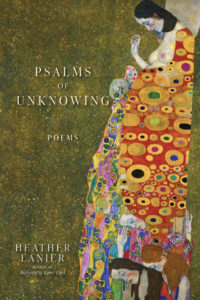
 Review by Christy Lee Barnes
Review by Christy Lee Barnes
In her new poetry collection, Psalms of Unknowing, Heather Lanier examines motherhood, spirituality, and grief. Lanier has previously published two chapbooks and the memoir Raising a Rare Girl.
The second poem of the collection, “Free Bible in Your Own Language,” boldly rejects the offer of a free Bible and seems ready to also reject any kind of conventional sacred text, writing:
Give me some space,
a quiet walk in the grass, unburdened
by your kiosk of Korean, Finnish, French….
With my footprints bending the blades,
I’ll write a psalm of unknowing,
knowing the sun will erase it, will call it back
into straight, green, speechless strands. (7)
This image of walking confidently away from organized religion opens the collection with a lush, bold, welcoming tone. I could feel the grass prickle beneath my feet, too, ready for this journey.
Given this opening, it came as a bit of a surprise to find the spiritual elements of the book so firmly rooted in one faith, Christianity. That said, these poems are in no way proselytizing, and they approach the Christian faith from many angles: confusion, wonder, comfort, irreverence, exhaustion, and even lust. (See “Ovulating in Church” for more on that one.) A careful reader of any, or no, faith background will find a rich text to explore here.
The book is divided into four sections, and the first section pits poems about the anticipation, discomfort, and wonder of pregnancy against the poet’s grief at police brutality, gun violence, and the loss of a father. The lines of “Rush Hour Commute, Good Friday” ricochet between contemplating the fragility of the unborn child, mourning a friend who has recently died in a car accident, and navigating the traffic jam. The brief mention of the holy day seems to stun even the poet herself. Readers are not so much lifted out of this moment by the poem but brought down into it, right in the passenger seat.
Section two turns a careful lens on motherhood. In “Your Eyes, My Daughter, Are Genius Caliber,” the poet writes, “and all your vowels / riper than fruit in the wooden bowl, / your oohs and ahs and ehs / whole as grapes in your mouth” (43). Many poems here discuss her daughter’s rare genetic syndrome, directing frustration and anger at those who mock or misunderstand. And a few poems of marriage here focusing on small moments (cleaning up toys, skipping stones) as a way to discuss the complications of a relationship.
Section three pairs contemplation of current events (politics, navigating the pandemic) with slivers of domestic life, such as scrolling social media or taking out the trash. Lanier’s strong grasp of craft carries her through these sometimes thorny topics. In “My Family and I Disagree About Politics,” the first line zings unexpectedly, catching our attention: “We will always get naked for the surgeons” (57). The poem continues opening out into more questions than answers, a puzzle that somehow perfectly captures the tension of family conflict. In “Beatitude for the Internet Age,” her lyricism elevates a poem about scrolling Instagram: “I broke / like a curse the word brand, / found half a robin’s egg / and didn’t wonder where was the other half / so I could logo it for love or praise” (64).
Section four settles into more overt spiritual contemplation, as the poet searches both in and outside of church for an elusive God, sometimes surrendering the search altogether and finding beauty even in that process, as in “Agnostic Visits the Nature Conservancy,” which ends, “Here’s your psalm. Stand beside / it, be the giant you’ll never be, / the branching of your lungs’ bronchi / vast as an inverted tree” (74).
Here at the end of the collection, we also return to her opening image of barefoot pilgrimage in “Canticle for the Ordinary,” as she describes her young daughter playing on the lawn: “Her run toward / the next wonder—dandelion, / gutter— / is still living scripture.” She ends this poem by describing these flowers her daughter is gathering as “canticles / of the ordinary, which seems / to be the most holy / we have” (80).
In this way, Lanier, just as many spiritual pilgrims have done before her, circles back to where she began, reminding us that she has been writing a new sacred text all along—for herself, for her daughter, and for any reader navigating their own spirituality and selfhood.
Psalms of Unknowing by Heather Lanier
Monkfish Publishing 2023
Paperback
9781958972069
Christy Lee Barnes is an educator originally from Los Angeles who now lives in Seattle with her husband and toddler son. Her writing can be found in Prairie Schooner, Plume, Cream City Review, Cagibi, Spillway, Literary Mama, The Comstock Review, Tin House’s “Broadside Thirty,” The Seattle Times, McSweeney’s, and elsewhere.
